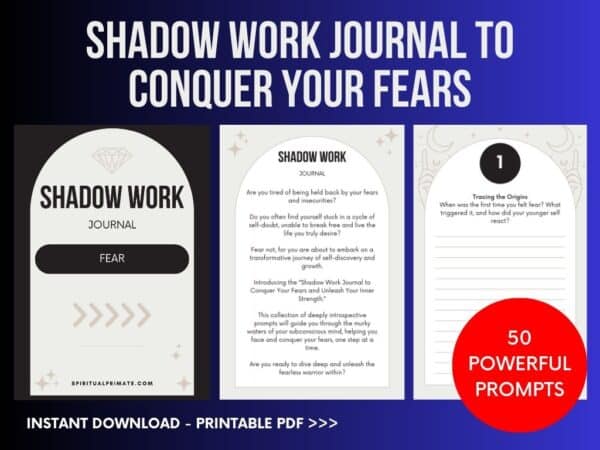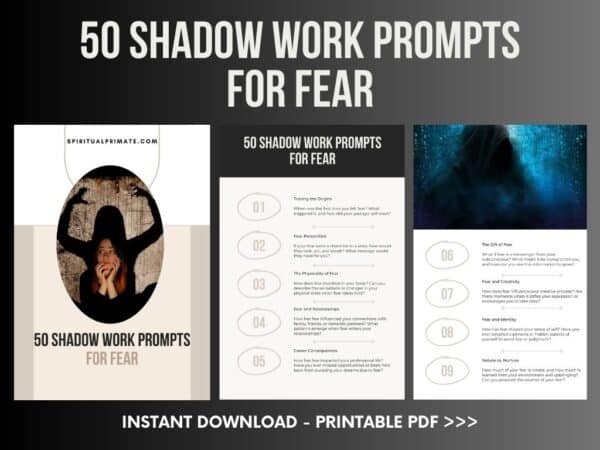Are you tired of being held back by your fears and insecurities? Do you often find yourself stuck in a cycle of self-doubt, unable to break free and live the life you truly desire?
Fear not, for you are about to embark on a transformative journey of self-discovery and growth. Introducing “50 Powerful Shadow Work Prompts to Conquer Your Fears and Unleash Your Inner Strength.”
This collection of deeply introspective prompts will guide you through the murky waters of your subconscious mind, helping you face and conquer your fears, one step at a time.
Are you ready to dive deep and unleash the fearless warrior within?

Understanding Fear
Fear is a natural, powerful, and often overwhelming emotion that every person experiences at some point in their lives. It is a response to a perceived threat, danger, or potentially harmful situation. The purpose of fear is to keep us safe by alerting us to potential harm and prompting us to take action to protect ourselves.
Fear can be triggered by various factors, such as unfamiliar situations, sudden changes, or potential harm to our physical or emotional well-being. Some common fears include fear of heights, public speaking, insects, darkness, and even social situations.
Despite its protective purpose, fear can sometimes become a hindrance, causing us to avoid situations that might be beneficial or preventing us from taking risks that could lead to personal growth. In some cases, excessive fear can develop into anxiety or phobias, which can significantly impact our daily lives.
It’s essential to recognize that fear is a normal part of the human experience. By understanding and acknowledging our fears, we can learn to manage them effectively, allowing us to live richer, more fulfilling lives. Remember, fear is not always a sign of weakness; instead, it can be an opportunity for growth and self-improvement as we face and overcome our fears.

Conquering Fears Through Shadow Work: An Empowering Journey
Fear is a natural and powerful emotion that serves as a warning signal, alerting us to potential harm and prompting us to take action to protect ourselves. While it plays a crucial role in our survival, fear can sometimes hinder our personal growth and overall well-being. Shadow work, a transformative self-discovery process, can help individuals confront and conquer their fears, unlocking their inner strength and potential.
Understanding Shadow Work
Shadow work is a psychological practice, first introduced by Swiss psychiatrist Carl Jung, that involves exploring and integrating the hidden, repressed, and often feared aspects of ourselves – our “shadow.” Our shadow consists of emotions, thoughts, and desires that we may not be proud of or are uncomfortable acknowledging. By bringing our shadow to light, we can understand and integrate these aspects of ourselves, ultimately freeing ourselves from the limitations imposed by fear.
How Shadow Work Helps Conquer Fears
1. Awareness and Acknowledgment
The first step in conquering our fears through shadow work is becoming aware of them and acknowledging their existence. By identifying our fears and examining their roots, we gain a better understanding of the underlying issues and can begin to address them constructively.
2. Self-Compassion and Acceptance
Shadow work encourages us to approach our fears with self-compassion and acceptance. By accepting that fear is a natural part of the human experience, we can begin to view it as an opportunity for growth and self-improvement rather than a hindrance.
3. Challenging Irrational Beliefs
Many fears stem from irrational beliefs or distorted thinking patterns. Shadow work helps us identify and challenge these beliefs, replacing them with more constructive and realistic perspectives. This shift in mindset can significantly reduce the intensity of our fears and empower us to face them with confidence.
4. Emotional Integration
Shadow work facilitates emotional integration by encouraging us to confront and process the emotions associated with our fears. By embracing these emotions rather than avoiding them, we can develop emotional resilience and reduce the impact of fear on our lives.
5. Empowerment and Inner Strength
As we engage in shadow work and face our fears, we tap into our inner strength and resilience, empowering us to overcome the challenges that once seemed insurmountable. This newfound strength can be applied to various aspects of our lives, leading to personal growth and self-actualization.
Shadow work is an empowering and transformative journey that can help us conquer our fears and unleash our inner strength. By bringing our shadow to light and integrating its aspects, we gain a deeper understanding of ourselves and our emotions, allowing us to face our fears with resilience and courage. By incorporating shadow work into our personal growth journey, we can overcome the limitations imposed by fear and unlock our full potential.

Shadow Work Prompts for Fear
1. Tracing the Origins: When was the first time you felt fear? What triggered it, and how did your younger self react?
2. Fear Personified: If your fear were a character in a story, how would they look, act, and speak? What message would they have for you?
3. The Physicality of Fear: How does fear manifest in your body? Can you describe the sensations or changes in your physical state when fear takes hold?
4. Fear and Relationships: How has fear influenced your connections with family, friends, or romantic partners? What patterns emerge when fear enters your relationships?
5. Career Consequences: How has fear impacted your professional life? Have you ever missed opportunities or been held back from pursuing your dreams due to fear?
6. The Gift of Fear: What if fear is a messenger from your subconscious? What might it be trying to tell you, and how can you use this information to grow?
7. Fear and Creativity: How does fear influence your creative process? Are there moments when it stifles your expression or encourages you to take risks?
8. Fear and Identity: How has fear shaped your sense of self? Have you ever adopted a persona or hidden aspects of yourself to avoid fear or judgment?
9. Nature vs. Nurture: How much of your fear is innate, and how much is learned from your environment and upbringing? Can you pinpoint the sources of your fear?
10. Fear in the Mirror: What parts of yourself do you fear others might see? How do these fears impact your relationships and self-image?
11. Fear’s Role in Decision-Making: How often do you make choices based on fear? What might your life look like if you made decisions from a place of courage instead?
12. The Language of Fear: How do you talk about fear, both internally and externally? What words or phrases do you use, and how do they shape your experience?
13. Fear as a Teacher: What has fear taught you about yourself and the world around you? Can you identify any valuable lessons or insights gained through facing your fears?
14. Fear’s Evolution: How has your relationship with fear changed over time? Can you recall moments when you’ve transcended fear or discovered newfound courage?
15. The Company Fear Keeps: What other emotions or beliefs often accompany your fear? How do these emotions interact and influence one another?
16. Fear and the Inner Critic: How does your inner critic use fear to hold you back? What strategies can you employ to challenge and disarm this critical voice?
17. Fear and Vulnerability: How does embracing vulnerability help you face your fears? Can you recall a time when letting down your guard allowed you to conquer fear?
18. Fear and Control: How much control do you believe you have over your fears? What aspects of your life do you feel powerless to change due to fear?
19. Fear and Procrastination: How does fear contribute to your tendency to procrastinate? What tasks or goals have you delayed due to fear, and what can you do to move forward?
20. The Ripple Effect of Fear: How does your fear influence the people around you? Can you identify any patterns of fear being passed on to others in your life?
21. Fear and the Future: What fears do you have about the future, and how do they impact your present? How can you shift your focus from fear to possibility?
22. Fear as a Boundary: How does fear serve as a boundary, protecting you from perceived threats or discomfort? When have you recognized that fear was keeping you safe?
23. Fear and Forgiveness: How does fear hinder your ability to forgive yourself and others? Can you identify any instances when releasing fear led to forgiveness and healing?
24. Fear and the Inner Child: How does your inner child experience fear? What can you do to comfort and reassure this younger part of yourself?
25. Fear and Gratitude: How can practicing gratitude help you shift your perspective on fear? What are you grateful for, even in the presence of fear?
26. The Masks of Fear: What masks do you wear to hide your fear? How do these masks impact your identity and relationships?
27. Fear and the Seasons of Life: How do your fears change with the seasons of your life? Are there any patterns or recurring fears that you’ve observed?
28. Fear and Intuition: How does fear affect your ability to trust your intuition? Can you differentiate between intuitive guidance and fear-based thoughts?
29. Fear and Acceptance: How can embracing acceptance help you face your fears? Can you accept your fear without judgment, and allow it to coexist with courage?
30. Fear and Change: How does fear influence your response to change? What changes in your life have been hindered or propelled by fear?
31. Fear and the Law of Attraction: How might your fears be attracting certain experiences or outcomes into your life? Can you use this awareness to shift your focus and manifest different results?
32. Fear and Time: How do you manage your fears over time? Do they grow, diminish, or transform as you age?
33. Fear in Dreams: What role does fear play in your dreams? Can you identify any recurring themes or messages that your subconscious is trying to convey?
34. Fear and Self-Compassion: How can you practice self-compassion in the face of fear? What loving words or actions can you offer yourself when fear arises?
35. Fear and Mindfulness: How can mindfulness practices help you observe and understand your fears? How can being present with your fear shift your experience of it?
36. Fear and the Body: How does your body respond to fear, and how can you care for your physical well-being during times of fear and anxiety?
37. Fear and Spirituality: What role does fear play in your spiritual journey? How can faith and trust help you navigate your fears?
38. Fear and the Collective Consciousness: How do your fears connect with the fears of others? How can you use this awareness to foster empathy and understanding?
39. Fear and Storytelling: How can you use storytelling as a tool for exploring and transforming your fears? Can you rewrite the narrative and create a new, empowering story?
40. Fear and Personal Growth: How has facing your fears contributed to your personal growth? What lessons or strengths have you gained through this process?
41. Fear and Adventure: How does fear influence your willingness to embark on new adventures? Can stepping outside your comfort zone help you face your fears?
42. Fear and Resilience: How can you cultivate resilience in the face of fear? What personal qualities or supports can help you persevere despite your fears?
43. Fear and Humor: How can humor help you cope with fear? Can you find the lighter side of your fears and laugh at them?
44. Fear and the Environment: How do external factors, like your surroundings or the people you’re with, impact your experience of fear?
45. Fear and Imagination: How can you harness the power of your imagination to face and overcome your fears? Can you visualize yourself conquering your fears and emerging victorious?
46. Fear and Mantras: What affirmations or mantras can you use to counteract fear and remind yourself of your inner strength?
47. Fear and the Elements: How can the natural elements (earth, water, fire, air) serve as metaphors for your fears? How can you use these metaphors to better understand and address your fears?
48. Fear and Ritual: How can creating rituals or ceremonies help you honor and release your fears? Can you design a ritual to confront and transform your fears?
49. Fear and Art: How can you express your fears through art, music, dance, or other creative outlets? How can the creative process help you process and heal your fears?
50. Fear and Action: Despite your fears, what actions can you take today to face them head-on and begin to make progress? How can taking action, even in small ways, help you overcome your fears?
As you reflect on your journey through these 50 powerful shadow work prompts, remember that conquering your fears is an ongoing process, and personal growth is a lifelong endeavor.
Embrace the challenges and victories alike, for they are the keys to unlocking your true potential. We hope these prompts have inspired you to face your fears head-on and embrace the boundless possibilities that lie ahead.
Now, as you move forward into a future filled with courage and resilience, we leave you with one final question: What new adventures await you as you step out of the shadows and into the light of your newfound strength?
Dive Deeper Into Your Shadow Work Journey
- Product on sale
 Printable Shadow Work Journal to Conquer Your Fears [PDF]Original price was: $11.98.$5.99Current price is: $5.99.
Printable Shadow Work Journal to Conquer Your Fears [PDF]Original price was: $11.98.$5.99Current price is: $5.99. - Product on sale
 50 Shadow Work Prompts for Fear | Printable PDFOriginal price was: $5.98.$2.99Current price is: $2.99.
50 Shadow Work Prompts for Fear | Printable PDFOriginal price was: $5.98.$2.99Current price is: $2.99.

